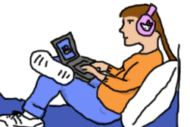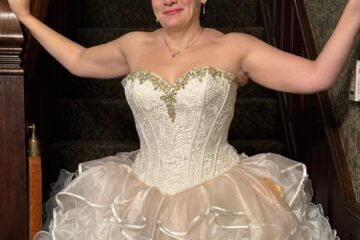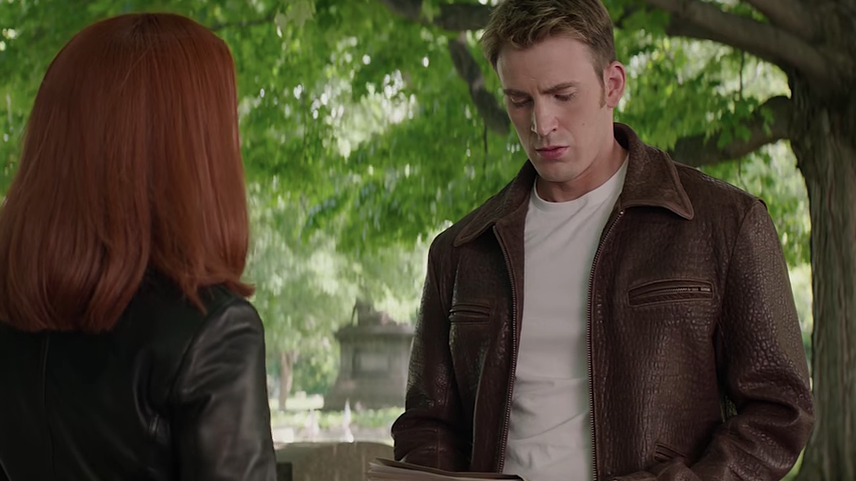There is a trope in movies were a gorgeous actress wears glasses and baggy clothes in the first act, then someone gives her fashionable clothes, contact lenses, and does her hair, and she spends the rest of the movie acknowledged as pretty. They call this “The Pretty Ugly Girl” and examples include “She’s All That”, “My Fair Lady” and at least one episode of every teen sitcom.
“It’s so unrealistic,” I’ve heard people say. Usually because the supposed-ugly girl is in fact only “Hollywood ugly” – because no one hires actually ugly actors to be made over in an ugly duckling narrative. Some gorgeous person will be cast and wear clothes that clash and heavy glasses and everyone pretends they are ugly.
But I have a weird perspective on it. You see – I was that girl. I have been the pretty ugly girl, and I can tell you the unrealistic part of the movie isn’t the brand of ‘ugly’ at the start, or the makeover, it’s what the movies do after the makeover.
I was born with even features, clear skin, and my dad’s high cheekbones. Like the girls heading into makeovers in the movies, my big flaw was being underweight, and let’s be serious, being called “Skinny Minnie” never felt like something to be ashamed of. The fact that movies try to make this a flaw in the same society that says “you can never be too thin or too rich” … I digress. I was average height, no deformities, no physical problems at all save that after fourth grade I had to wear glasses to see far. (And mostly avoided wearing them because of internalized fear of looking nerdy.)
Trust me: I look at pictures of me as a kid and I see a beautiful child, or at the very least, a normal-looking one.
That didn’t stop me from also being ugly.
Everyone told me I was ugly, so I believed it. I wore second-hand clothes that didn’t match, and I didn’t bother wasting time on my hair or appearance, because why would I? I was ugly.
Kids on the school bus chanted “U-G-L-Y you ain’t got no alibi you UGLY! VIBBERT! YOU UGLY!” And others rode their bikes past my house to shout the same.
How to explain the contradiction? There’s a class element – poor kids are teased for being poor, but the bullies never call it that – might not even know that’s what they’re upset about. They just know there’s something UNCLEAN about this person, and it must be punished.
And there’s a behavioral component. I was awkward, precocious, attention-seeking. I wanted so desperately to be liked. To be normal. My needy attempts were no doubt revolting to my age-mates.
My mom always said they were just jealous, and she might have a point – I got good grades, had a twin, the aforementioned unfairly clean skin – but at the time I just thought, “Jealous of what? Being ugly, poor, or stupid?”
Whatever the reason, it stands: I was treated as ugly and dressed appropriately, despite having the physical features that would have gained me popularity had I but known enough to achieve “fitting in.”
Then came Micki DeGray.
It was the first day of seventh grade and we were taking Chemistry, and instead of individual seats, the room was made up of two-person black-topped “benches.” I approached the last empty seat in the chemistry classroom, having shown up late, and felt ashamed that Micki, a relatively nice girl, was going to have to be inflicted with a pariah next to her. It would have been better to arrive early, then the last open seat would be next to me, as usual, and some boy would gingerly sit as far as possible from me and …
Micki looked up as I carefully set my books on the very edge of the lab desk. She smiled. “Cool! I get the smartest lab partner!”
I’d have swum through sulfuric acid for her from that moment on.
At this time, in the late 1980s, in small town Ohio, there was a Junior High dance almost every month. I’m perplexed how many of them we had. Were they afraid we’d join gangs and do drugs if we didn’t have a chance to regularly swill overly-sweet punch in the school cafeteria under crepe paper streamers and balloons? There was a Valentine’s Day dance and a St. Patrick’s Day dance and an Arbor Day dance. Each dance ended with “We’re Not Gonna Take It” by Twisted Sister, and everyone rushing to the stairs at the front of the room for a group photo, pretending this was spontaneous enthusiasm.
… yeah we were collectively dorks. (Again, had I but known I was not alone in sheer dorkiness!)
My first Middle School dance, I wore one of my mom’s dresses, a red knit polyester thing with a plunging neckline and a slit up the side. It came with a matching choker with a giant red rose on it. Very 70s. In the 80s.
Literally everyone else at the dance was in jeans. So that went over well.
I stalked around the room, a clear patch of empty floor following me on all sides, repelling others like a like-charged magnet. I drank a cup of punch, watched the others dance, and went home.
I didn’t learn. I don’t know why I was so determined to make a mockery of myself by going to every single dance, like rolling loaded dice and expecting them to come up different, but I did.
In 7th grade, I had a crush on a boy named Greg. It was his eyelashes, they were thick. That was the bar for attraction for pre-teen me.
I was hanging out with Micki and she asked if I liked anyone, and I confessed. “But it’s ridiculous. He’d never want to be with me. Look at me!”
Micki took my hands. “What you need is a make-over!”
She was so confident, so sure, her long elegant fingers cool in mine, and I knew what Cinderella felt like meeting her fairy godmother.
So the night before the next junior high dance, I went to Micki’s house and she and her best friend debated blush colors and hair styles while I sat in submissive delight. I quivered under the unfamiliar sensation of little sponges and cotton pads smoothing over my skin.
After some discussion, Micki laid out one of her dresses, a rather … businessy thing that was brown and beige with an attached, wide belt. It had a narrow skirt of the type I avoided because I had “big hips” and Micki paired it with beige ankle boots and thick costume jewelry.
I was surprised. It wasn’t what I thought I’d be putting on. Maybe I expected a pretty party dress, something poofy and jewel-colored. Or else some jeans and a hip off-the-shoulder top in 1980s neon? My magical princess dress was remarkably plain. It called into question all I knew about what made clothing good or bad.
(This was before the Great Secret was revealed to me: Good Clothes are New Clothes, that’s it. That’s the only secret. There’s no matching a season with a hue or only wearing three shades or not mixing blues … the kids who fit in are just wearing off-the-rack boring shit but it’s new so it matches the images of ideal clothing presented in advertising and media.)
Micki stepped back, joyful, brush poised, but hesitating. “No. That’s it. You’re perfect!”
We walked into the middle school together. I felt anxious for the unfamiliar boots, that I was scuffing them up. I didn’t know what to do with my hands, unable to touch my face. I wondered if this would even work. Surely my awfulness wasn’t skin deep. The kids would still tease and make fun of me and it would prove that appearances didn’t matter.
But I hoped not.
We pulled back the glass doors of the cafeteria and faces turned to look up at us. People reacted to me like Cinderella entering the palace ballroom. Literal gasps.
Micki took my arm and squired me down the steps, proud as a fairy godmother could be. “Is that Vibbert?”
One of the meanest girls blinked her heavily made-up eyes, her sharply penciled eyebrows exaggerating her surprise. “You’re … actually kind of pretty.” She called over her posse and I was an object of admiration, of curiosity. Girls who avoided me like I was covered in disease crowded around.
Micki glowed.
The boys stared, but kept their distance, cowed by the aggression of female things. Only one approached me directly, when I was on my way to the bathroom and alone to be cornered. He was a sixth-grader I didn’t know, a foot shorter than me. He gave me a smarmy grin. “If you looked like that all the time,” he said, “I’d be willing to go out with you.”
I wasn’t flattered.
But I had a ball. I felt like people who had never seen me were seeing me, accepting me. I danced all night. I even screwed up my courage and asked Greg if he wanted to dance. (He said “Uh … maybe later.” and I took that as a win.)
I stayed until the streamers were torn down and stayed up that night, writing about the triumph in my diary.
As I washed off my makeup and set Micki’s clothes aside to be laundered and returned to her, I vowed that this was not going to be one magical night in my life. No. This was a turning point. The start of my transformation into a Popular Girl.(TM)
I’d seen what Micki and her bestie did. Taking off my glasses for the night was easy. Fluffing my bangs up and spraying them with hairspray was easy. I had an old eyeliner pencil my big sister had discarded and a tube of my mom’s lipstick I could use as both blush and shadow. I could do this.
I don’t remember what I wore to school, the Monday after the dance. I do remember I agonized over it, picking carefully among my dresses for the one most Micki-like. Pairing shoes. Putting on panty hose. I spent an hour on my hair and makeup in front of the hallway mirror. I remember feeling pretty confident in my appearance, that I’d re-created the look.
I watched carefully for reactions as I arrived at school. The first kids I passed didn’t react, but it was early in the morning and everyone was tired. Surely, by lunch?
Here’s the thing: the makeover didn’t make people see ME, didn’t make them approve of ME. They just saw and approved of my appearance. Maybe there had been some extra thrill seeing the ugly nerd turn pretty, like the way a fresh coat of paint is more appealing on an old house because it really needs it, but that thrill doesn’t come with daily maintenance.
Whatever the reason, I was not treated differently. Greg bolted in the opposite direction when he saw me looking his way. (Wisely. I was thinking of following up on “maybe later.”)
People still cringed away from me. They left empty seats around me in the cafeteria, even though we weren’t supposed to. They mocked my free lunch and knocked my books out of my hands. Nothing. Changed.
Two days later, the mean girl pulled me aside. “Stop trying to do makeup; you’re embarrassing yourself.”
It was a lot of work, doing hair and makeup every morning, putting together ‘outfits’ from my second-hand clothes. Slowly, I fell back into my old habits, and I was ugly again.
The people who had been my friends before still were. The people who hadn’t still weren’t. Because ultimately, and here’s where the Pretty Ugly Girl trope fails — it was never about the clothes, the hair, the makeup. It wasn’t about looks. What made me ugly was intrinsic to me.
Because I was never ugly. I was pretty-ugly. And that doesn’t get fixed with a makeover.


